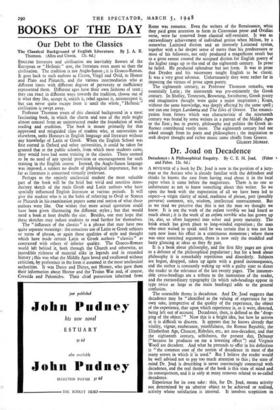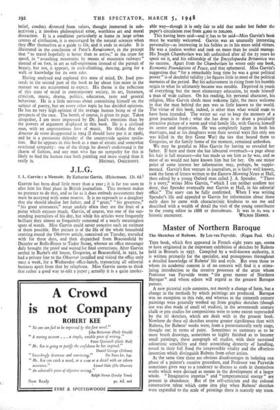Dr. Joad on Decadence •
A REVIEWER of a book by Dr. Joad is now in the position of a jury- man at the Assizes who is already familiar with the defendant and thinks he knows, the case from having read about it in the local paper when it came before the magistrates. There is no one so unfortunate as not to know something about this writer. So we open the book with the expectation of all we have been led to expect—a virgin clarity of mind, readiness of phrase, pert (possibly perverse) comment, wit, wisdom, intellectual entertainment. But as we read we perceive that this is not the man we thought we knew. It is not the work of the enfant terrible we had heard so much about ; it is the work of an enfant terrible who has grown up (as, alas, so often happens) into sober and prosy maturity. The brisk attack' has given place to long-winded exposition ; the man who once waited to speak until he was certain that it was not his turn now loses his effect in a continuous monotone ; where there was once sustained argument, there is now only the muddled and hasty glancing at ideas as they fly past.
It is a book about philosophy, and the first fifty pages are given to a defence of the philosophical populariser ; but for a book about philosophy it is remarkably repetitious and disorderly. Subjects are begun, dropped, taken up again with a grand inconsequence, and the author is constantly waking up with a guilty start to direct the reader to the relevance of the last twenty pages. The innumer- able cross-headings are a tribute to the inattention of the reader, and the extraordinary typography (in which sub-headings appear in type twice as large as the main headings) adds to the general confusion.
The ostensible theme is decadence. And Dr. Joad suggests that decadence may be " identified as the valuing of experience for its own sake, irrespective of the quality of the experience, the object of the experience, that upon which experience is, as it were, directed, being left out of account. Decadence, then, is defined as the drop- ping of the object." Now this is a bright idea, but how he arrives at it is difficult to discern. It appears that he knows already that vitality, vigour, exuberance, youthfulness, the Roman Republic, the Elizabethan Age, Chaucer, Rabelais, etc., are non-decadent, and that the eighteenth century, selfishness, the present day, Debussy (" because he produces on me a lowering effect ") and Virginia Woolf are decadent. And what he pretends to offer in his definition is " the common core of the notion of decadence in most of the many senses in which it is used." But I believe the reader would be well advised not to pay too much attention to this ; the state of mind Dr. Joad is describing is never convincingly connected with decadence, and the real theme of the book is this state of mind and its consequences, and it is only at many removes related to so-called decadence.
Ertperience for its own sake : this, for Dr. Joad, means activity not determined by an ulterior object to be achieved or realised, activity whose satisfaction is internal. It involves scepticism in belief, conduct divorced from values, thought immersed in sub- jectivism ; it involves philosophical error, worthless art and moral distraction. It is a condition particularly at home in large urban centres of civilisation, it is encouraged by the natural sciences when they Offer themselves as a guide to life, and it ends in accidie. It is illustrated in the conclusion of Pater's Renaissance, in the precept that " to travel hopefully is better than to arrive," in the craze for speed, in " assaulting mountains by means of mountain railways " instead of on foot, in art as self-expression instead of the pursuit of beauty, but not, it appears, in rock-climbing, dancing, going for a walk or knowledge for its own sake.
Having analysed and explored this state of mind, Dr. load pro- ceeds in the second part of the book to lay about him more in the manner we are accustomed to expect. His theme is the reflection of this state of mind in contemporary society, its art, literature, criticism, music, drama, politics, education, taste and general behaviour. He is a little nervous about committing himself on the subject of poetry, but on every ether topic he has decided opinions. He has no very high opinion of the average human being or of the prospects of the race. The bomb, of course, is given its page. Taken altogether, I am more impressed by Dr. Joad's emotions than by the powers of argument displayed in this book. He is a civilised man, with an unpretentious love of music. He thinks that the douceur de vivre disappeared in 1914 (I should have put it at 1906), and he is a passionate defender of the countryside against spolia- tion. But he appears in this book as a man of erratic and somewhat restricted sympathy: one of the things he doesn't understand is the charm of fashion, and any man who has no sympathy for this is likely to find the human race both puzzling and more stupid than it































 Previous page
Previous page